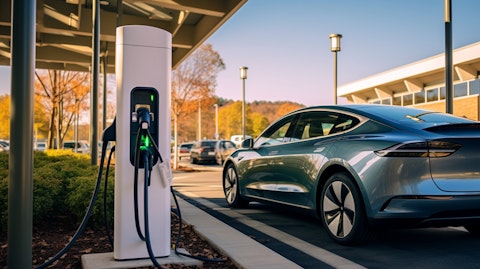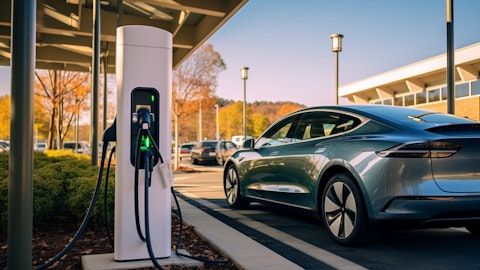We recently published a list of 10 AI Stocks Gaining Wall Street’s Attention. In this article, we are going to take a look at where Rivian Automotive, Inc. (NASDAQ:RIVN) stands against other AI stocks gaining Wall Street’s attention.
On May 27, Investment bank UBS Group AG maintained a “Neutral” rating for Rivian Automotive, Inc. (NASDAQ:RIVN) and upgraded its price target to $13 from $12. Rivian Automotive is an automaker that creates and manufactures electric vehicles, as well as software and services.
The Swiss investment bank views a positive long-term outlook for the stock despite the challenging near-term environment for EVs. This is particularly because of the upcoming launch of the R2 model, anticipated in 2026.
“We remain Neutral rated on RIVN given a likely tougher near-term EV environment, but we do see potential for a positive longer term outlook, particularly as we get closer to R2 launch and gain more clarity on the potential ramp.”

A state-of-the-art electric vehicle charging at a station at a suburban mall.
Here is the investment note from analyst Joseph Spak:
“In this report, we focus on Rivian-specific trends from our 2025 UBS Evidence Lab Global EV survey results. While an increasing number of U.S. consumers are aware of the Rivian brand, overall awareness remains low (13% vs. 10% last year). Further, only ~5% of BEV owners/buyers indicated they would consider purchasing a Rivian (up from 4.5% last year). For reference, we estimate Rivian’s 2024 U.S. BEV share (excluding vans) was ~3%. The survey indicates that consumers still want more EV choices and alternatives, which may be positive for Rivian. In fact, of those who would consider buying a Tesla, ~30% are more likely to consider purchasing a Rivian (up from 26% last year).
However, overall U.S. interest in EVs has declined, and given potential pushout of EPA requirements and repeal of the California waiver, the EV inflection may be further out than expected. The removal of the California waiver may also limit Rivian’s ability to generate and sell ZEV credits. Slower EV growth is likely exacerbated by a lack of affordable options—only ~35% of respondents believed EVs are affordable vs. internal combustion engine vehicles. Rivian’s R1S SUV starts at $75,900 while the R1T pickup starts at $69,900. The average vehicle price in the U.S. is currently $47,900, while the average BEV (including tax credits) is $57,400.
The potential removal of consumer clean vehicle tax credits (CVC), including the ‘leasing loophole,’ could further limit EV adoption. In 2024, we estimate that ~59% of Rivian R1s were leased. While not all demand would be destroyed if CVCs are removed, we believe it would still be a headwind. These are key reasons why the R2 model launch is so critical to the equity story. R2 remains on track for 2026 with a starting price of ~$45,000.
Near-term, especially if U.S. policies move away from an EV focus, continued cost reductions on the R1 and increased manufacturing efficiencies are key. We remain Neutral rated on Rivian given a likely tougher near-term EV environment, but we do see potential for a positive longer-term outlook, particularly as we get closer to the R2 launch and gain more clarity on the potential ramp.”
Overall, RIVN ranks 7th on our list of AI stocks gaining Wall Street’s attention. While we acknowledge the potential of RIVN as an investment, our conviction lies in the belief that some AI stocks hold greater promise for delivering higher returns and have limited downside risk. If you are looking for an AI stock that is more promising than RIVN and that has 100x upside potential, check out our report about this cheapest AI stock.
READ NEXT: 10 AI Stocks on Analyst’s Radar Today and 10 AI Stocks on Wall Street’s Radar.
Disclosure: None. This article is originally published at Insider Monkey.



